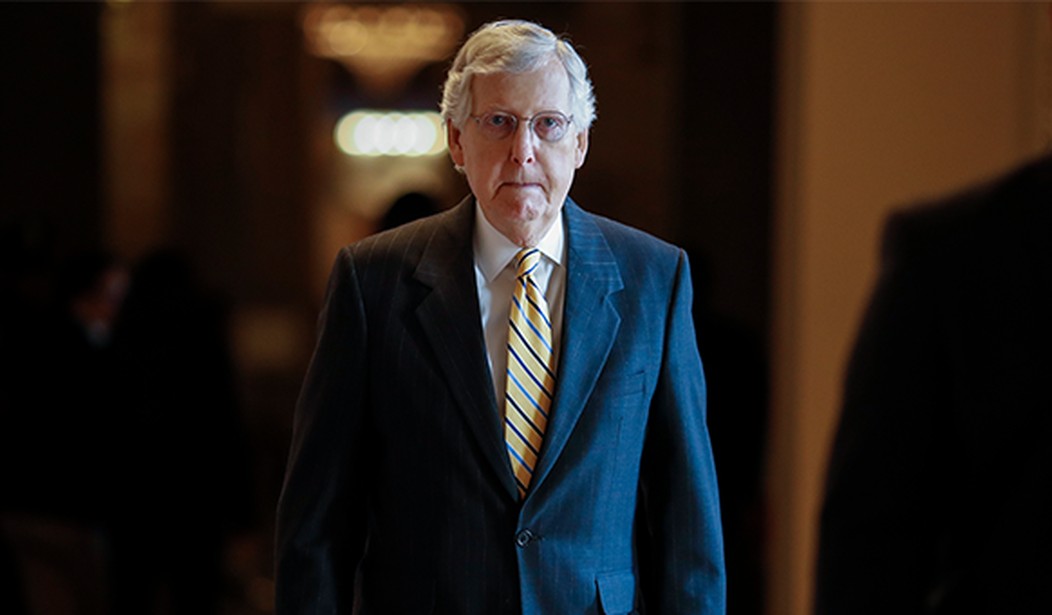Something significant happened yesterday: Senate Republicans appeared to demonstrate that they -- at least theoretically -- have the votes to confirm President Trump's yet-unannounced Supreme Court nominee. This was no foregone conclusion at the outset, given the very thorny dynamics at play. But when the majority leader came to the floor and vowed that the vote would occur, that seemed like a pretty strong signal that the ever-cautious Kentuckian had his ducks in a row. We already knew that Lisa Murkowski and Susan Collins were opposed to moving forward prior to the election, and that both reportedly expressed strong reservations about the current reputed frontrunner when her name was in the mix for the vacancy filled by Justice Kavanaugh.
Those defections put the number at 51 potential Senators in support, leaving very little margin for error. But then a steady drumbeat started to emerge, as Senate Republicans rallied around the case. Colorado's Cory Gardner, who is a highly vulnerable incumbent, delivered what appeared to be the decisive statement that tipped McConnell's whip count to a simple majority in a favor of voting on a nominee this year. Then Mitt Romney added his voice to the mix, affirming that he too is on board (relatedly, read this column by Ross Douthat, which was aimed squarely at Romney). So that is -- again, in theory -- 51 votes, adding tiny extra cushion that could come into play if this scenario involving the Arizona seat should arise. Thanks to the Reid Rule, one of Senate Democrats' many unilateral power grabs, 50-plus-one votes is all it takes to confirm federal judges.
So if the Trump nominee (who will be announced Saturday, according to the president) performs adequately in the confirmation process, the opportunity to seal a confirmation should be at hand. I'll note that every single Republican Senator supported Barbara Lagoa's confirmation to the 11th Circuit last year (plus a majority of Senate Democrats), just as every Republican backed Amy Coney Barrett's confirmation to the 7th Circuit (along with a small handful of Democrats) in 2017. All else being equal -- which is not a breezy assumption that can be made in 2020! -- the votes are there. The question becomes: When? Should Senate Republicans vote prior to the election, or do so after the election, in the lame duck session?
Recommended
Both courses of action carry significant political risks. Calling the vote before the election could help seal the fate of the GOP Senate majority, which represents the strongest potential guardrail against wild Democratic overreach in the (somewhat likely) event of a Trump loss. A subsection of conservative voters might feel like securing three Supreme Court confirmations was an historic win unto itself, and be less motivated to act as crawl-over-broken-glass voters on November 3rd. Trump-skeptical conservatives who might have otherwise turned out for the president and down-ballot races, out of fear and passion on this issue, may end up deciding that they're satisfied with the lasting judicial legacy, and lose their sense of urgency.
At the same time, the 'dialed up to 11' Democratic base would be more desperate and energized than ever -- and some moderate voters who would have preferred a post-election confirmation process may decide to punish Republicans for 'rushing' through the process -- which Democrats will be working overtime to wrongly frame as radical and illegitimate. So a successful confirmation vote before the election would guarantee that the seat is filled by Trump, but could conceivably harm Republicans at the polls. And if Democrats win a sweeping victory in November, God knows what they might try to do with their power, given their long-established penchant for unprecedented power grabs (often abetted by media ambivalence or support). Some smart people hold this view:
Any compromise on SCOTUS can't be reliant on Dems keeping their word on the filibuster or court-packing in the future. A better argument imo is that the best/only way to prevent such a move is a Republican Senate, and a vote b4 the election could make that less likely.
— (((AG))) (@AGHamilton29) September 21, 2020
If the vote is pushed to post-election, a vacant SCOTUS seat as a 'live' issue could potentially maximize conservative and center-right turnout for the president and Senate Republican candidates in crucial, tight races. If Trump wins or Republicans retain their majority, the case for a speedy lame-duck confirmation is pretty cut and dried. It would essentially be a lock, in my estimation. However, if voters sweep the GOP out of the White House and Senate control, the political will to follow through with a lame duck confirmation could crumble. And as I wrote on Monday, as someone who has become pretty hardcore on these matters -- as the extent of Democratic ruthlessness and unscrupulousness became crystal clear -- even I would not be comfortable with that move. I think it would be harmful to the republic, especially in this loaded national moment. Ignoring voters' just-expressed wishes to ram through a critical lifetime appointment is a different proposition than doing so pre-election, when the case is far more solid, in my view.
In short, the risk of holding the final vote until after the election (or staging it in the midst of a contested and acrimonious post-election haze of controversy) is that if the election goes poorly across-the-board for the GOP, they could very realistically end up losing the presidency, losing the Senate, and losing a rare and precious opportunity to fill a Supreme Court seat and shift the Court's ideological balance. Imagine the recriminations if they went 0-for-3. In my mind, this is the biggest risk of all -- though a case can be made that a quick confirmation, followed by a decisive electoral loss and subsequent Democratic radicalism could be worse. This is the calculation Mitch McConnell must make in the coming days. I don't envy his position.

























Join the conversation as a VIP Member